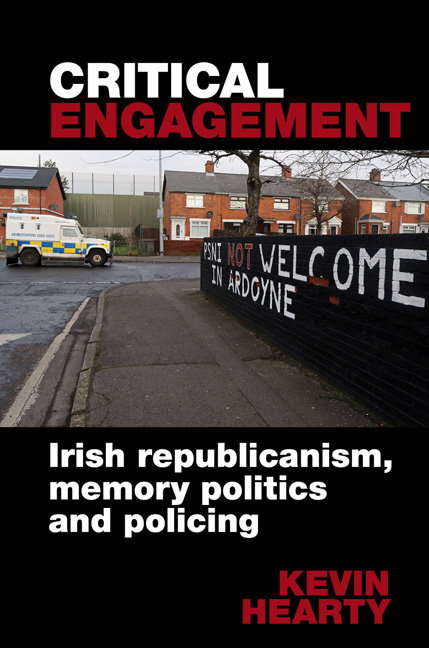Book contents
- Frontmatter
- Contents
- Acknowledgements
- List of Figures and Tables
- List of Abbreviations
- Introduction
- 1 Understanding a Fraught Historical Relationship
- 2 Irish Republican Memory as Counter-Memory
- 3 Ideology and Policing
- 4 The Patriot Dead
- 5 Transition, ‘Never Again’ and ‘Moving On’
- 6 The PSNI and ‘Community Policing’
- 7 The PSNI and ‘Political Policing’
- Conclusion
- References
- Index
4 - The Patriot Dead
- Frontmatter
- Contents
- Acknowledgements
- List of Figures and Tables
- List of Abbreviations
- Introduction
- 1 Understanding a Fraught Historical Relationship
- 2 Irish Republican Memory as Counter-Memory
- 3 Ideology and Policing
- 4 The Patriot Dead
- 5 Transition, ‘Never Again’ and ‘Moving On’
- 6 The PSNI and ‘Community Policing’
- 7 The PSNI and ‘Political Policing’
- Conclusion
- References
- Index
Summary
Introduction
This chapter examines the curious case of how the memory of those killed by policing agents could later be used to advocate support for policing in the North of Ireland. Leading on from examination of ideological contestation on policing to which the dead are inextricably linked, it interrogates contending narratives on whether ‘critical engagement’ is in furtherance of or a contradiction of the ideological goals for which the Irish republican patriot dead sacrificed themselves. It investigates the main components of the policing narrative proffered by each side of the debate; ‘critical engagement’ being the extension of the courage shown by the patriot dead during armed struggle, or whether endorsement of policing represents a self-inflicted defeat of the goals for which the patriot dead sacrificed themselves. This is followed by an examination of the political utility of the patriot dead to competing ‘memory entrepreneurs’ that critically evaluates why each side attaches so much worth to the patriot dead and why they go to considerable lengths to distance them from intra-communal rivals.
Irish republican martyrology
Firmly ensconced in ‘Irish republican theology’, the patriot dead are embedded in ‘the language of sacred soil and the cult of the dead’. The ‘historical determinism’ within Irish republicanism has seen the patriot dead provide a mandate to various Irish republican groupings, even if a mandate from the living evades them. One can say without exaggeration that the patriot dead are omnipresent in the memory politics of modern Irish republicanism. The ‘cult of the dead’ is, however, hardly exclusive to Irish republicanism. It has been indulged in by political actors the world over. Before turning attention to the Irish republican case study, it is pertinent to outline why the ‘cult of the dead’ has such a strong appeal.
Christ's position as the ultimate martyr who died for a greater ‘cause’ projects a latent divinity onto those who give themselves in furtherance of a political cause couched in Christian traditions of self-sacrifice. Even those who die whilst engaging in violence bathe in this divinity that places them beyond reproach. Narratives of those killed in political conflict revolve around the selflessness of their sacrifice made for the greater good of the cause. It is the selflessness of this sacrifice that sanctifies and legitimises their very cause.
- Type
- Chapter
- Information
- Critical EngagementIrish republicanism, memory politics and policing, pp. 121 - 148Publisher: Liverpool University PressPrint publication year: 2017



